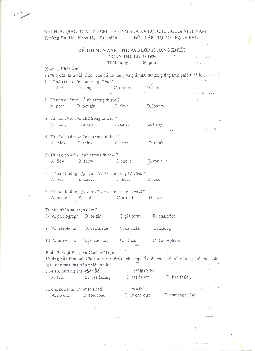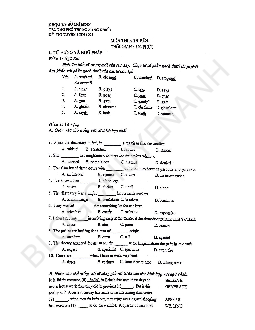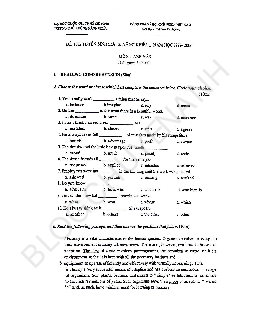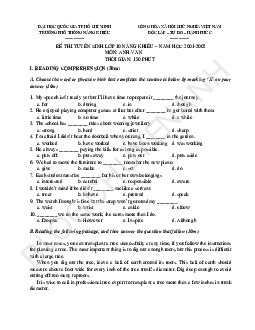













Preview text:
BỘ SÁCH CON MÈO
TUYỂN TẬP 10 ĐỀ THI CHUYÊN ANH VÀO 10
Dạng đề thi sở GD & ĐT Hà Nội 1
ĐỀ THI VÀO THPT CHUYÊN THUỘC SỞ GD & ĐT HÀ NỘI MÔN TIẾNG ANH
THỜI GIAN LÀM BÀI: 100 PHÚT
Gồm có 4 trường:
• THPT Chuyên Hà Nội Amsterdam • THPT Chuyên Chu Văn An
• THPT Chuyên Nguyễn Huệ • THPT Chuyên Sơn Tây
• Các bạn luyện thi vào các trường chuyên trên toàn quốc có thể luyện tập thêm. ĐỀ SỐ 1
PART I. LISTENING (2.0 pts)
PART II. PHONETICS (0.5 pt)
I. Circle the letter A, B, C or D to indicate the word whose underlined part differs from the other three
in pronunciation in each of the following questions (0.3 pt)
1. A. woodland B. moorland C. hooked D. woollen 2
2. A. sanction B. amass C. ambassador D. embassy
3. A. mineral B. determine C. examiner D. mining
II. Circle the letter A, B, C or D to indicate the word whose underlined part differs from the other three
in position of primary stress in each of the following questions (0.2 pt)
4. A. descent B. dissent C. discontent D. contemplate
5. A. eradicate B. kilometer C. characterize D. communism
PART III. VOCABULARY AND GRAMMAR (2.5 pts)
I. Circle the best answer (1.0 pt)
1. _____________ the cold weather and my bad leg, I haven’t been out for weeks.
A. What with B. If it weren’t for C. Barring D. Given
2. You’ll be pleased to know that you are _____ for a scholarship if you wish to apply. A. entitled B. eligible
C. appropriate D. particular
3. Those campers are really ___________. They have no idea how to set up a tent. A. white B. blue C. green D. black
4. __________ I’ve told him not to go out with those people, but he wouldn’t listen. Just let him face the music now. A. Many a time B. Many the time C. Quite a time D. For a time
5. The actor was so nervous that he could only remember small _________ of dialogue A. shreds
B. pieces C. patches D. snatches
6. Most people _____ family heirlooms and keep them safe. A. cosset
B. cherish C. nourish D. nurture
7. There was _______ evidence to bring charges against the man. A. insubstantial
B. interior C. ineffective D. insufficient
8. Richard Burton was noted for his clear ………….of words. 3
A. enunciation B. interpretation
C. announcement D. accentuation
9. "Why has Dave resigned his job?" "It was my suggestion _____ his education."
A. why didn't he continue B. him to continue
C. that he continue D. he continues
10. We woke up at the ____ of dawn this morning. A. touch B. turn C. burst D. crack
II. Think of 1 word which can be used appropriately in 3 sentences (0.3 pt) 1.________ •
Stop playing a game of cat and mouse with me. I need a________answer and not your misleading comments. •
You’re wrong about him. Ask Loraine and she’ll put you________about the incident. •
Go________ on for about 200 yards. The shop is on the left. You can’t miss it. 2.________ •
It’s obvious that ties within the________ family are far stronger than those in the extended one. •
The scientists feared that the chain reaction would lead to the meltdown of the________ reactor. •
During the Cold War the two blocks had enough________ missiles to destroy our planet many times over. 3.________ •
Computer technology lets us ________a lot of data on a single CD •
I can tell you that a telling-off is in________ for Dennis, if he doesn't start behaving himself. •
Keep drugs out of reach of children and ________them in a safe place. "You can’t be too careful, can you?
III. Form the collocations using the verbs and prepositions from the boxes. Complete each sentence
using a collocation in the appropriate form. Each verb and each preposition must be used ONE only. (0.7 pt) 4 STAMP PLUCK LAY ZERO ON BY UP IN NAIL HAND SEE DOWN TO THROUGH
1. The watching team could ____________ the windows that the interior of the chamber quickly filled with smoke.
2. One cable spelled out a deal that Turkey's leadership was trying to ___________ to buy 16 Super Cobra helicopter gunships.
3. Eventually I ___________ courage and booked a ticket to Amsterdam with the sole purpose of getting laid.
4. Somebody's up there going and it's actually the bass so we'll be wanting to ____________ on the bass
in a big way in music because that's oftentimes giving us much more information than the melody.
5. If you want to while watching TV while __________ the car, or you can easily notalgia , a slight
increase in the best position.
6. Net income was 97 million euros ($123 million), compared with a loss of 203 million euros a year
earlier, the closely held company said today in a statement ___________ reporters in Munich.
7. They were on a granite slab that had fallen centuries ago and __________ the shore with the water rippling at it.
IV. Give the correct form of the words to complete the passage (0.5 pt)
Pop art was a(n) (1. CONVENTION)_____________ art style in which commonplace objects such as
comic strips, soup cans and road signs were used as subject matter, and were often incorporated into the work.
The pop art movement was largely a British and American cultural phenomenon of the late 1950s and
‘60s. Art critic Lawrence Alloway, referring to the prosaic (2. ICON)___________ of its painting and
sculpture, named the movement pop art. It represented an attempt to return to a more objective and universally
accepted form of art after the dominance in both the United States and Europe of the highly personal abstract
(3. EXPRESS)_____________. The art form was iconoclastic, rejecting the (4. SUPREME)___________ of
the ‘high art’ of the past and the (5. PRETEND)____________ of other contemporary avant-garde art. Pop
art became a cultural institution because of its close reflection of a particular social situation and because its
easily comprehensible images were immediately exploited by the mass media. Although the critics of pop art
describe it as sensational and non-aesthetic, its proponents saw it as an art that was democratic and not 5
discriminatory,bringing together both connoisseurs and untrained inexperienced viewers. Even though public
reaction to pop art was unfavorable it found critical acceptance as a form of art suited to the highly
technological, mass media-oriented society of western countries.
PART IV. READING (3.0 pts)
I. Circle the best option A, B, C or D that best fits each of the blanks (0.8 pt)
(1) __________ popular belief, one does not have to be a trained programmer to work online. Of course,
there are plenty of jobs available for people with high-tech computer skills, but the growth of new media has
(2) __________ up a wide range of Internet career opportunities requiring only a minimal level of wide range
of Internet career opportunities requiring only a minimal level of technical (3) __________. Probably one of
the most well-known online job opportunities is the job of Webmaster. However, it is hard to define one basic
job description for this position. The qualifications and responsibilities depend on what tasks a particular
organization needs a Webmaster to (4) __________.
To specify the job description of a webmaster, one needs to identify the hardware and software that the
website will manage to run (5) __________. Different types of hardware and software require different skill
sets to manage them. Another key factor is whether the website will be running internally or externally. Finally,
the responsibilities of a webmaster also depend on whether he or she will be working independently, or whether
the firm will provide people to help. All of these factors need to be considered before one can create requiring
(6) __________ knowledge of the latest computer applications. (7) __________, there are also online jobs
available for which traditional skills remain in high (8) __________. Content jobs require excellent writing
skills and a good sense of the web as a “new media’.
The term “new media” is difficult to define because it encompasses a constantly growing set of new
technologies and skills. Specifically, it includes websites, email, internet technology, CD-ROM, DVD,
streaming audio and video, interactive multimedia presentations, e-books, digital music, computer illustration,
video games, virtual reality, and computer artistry.
Question 1: A. Apart from B. Contrary to C. Prior to D. In contrast to
Question 2: A. taken B. sped C. set D. opened
Question 3: A. expertise B. master C. efficiency D. excellency
Question 4: A. conduct B. perform C. undergone D. overtake 6
Question 5: A. on B. over C. in D. with
Question 6: A. built-in B. up-market C. in-service D. in-depth
Question 7: A. However B. Therefore C. Moreover D. Then
Question 8: A. content B. demand C. reference D. requirement
II. Fill each of the following numbered blanks with ONE suitable word (0.7 pt)
Many actors do not like working with children or animals. This is probably 1_________ they are afraid that
the audience may become more interested in the children and animals than in them. Actors can have problems
of a different kind when they are required to eat or drink on stage . If they have too much food in their mouths,
the words they say may not be clear, and they may even end up coughing and choking. Other problems can
occur with food when 2_________ are being made. In a recent film, during 3_________ a family was
waiting to have a meal, one of the actors entered with a large roast chicken on a tray and then had to begin to
cut some meat from it while he was speaking. By mistake, the actor cut off a whole leg of the chicken and then
he completely forgot what his next words were. It was necessary to film the scene 4_________ . This would
not really have mattered 5___________ there had been another roast chicken in the studio, but there was not.
At 6_________ , nobody knew what to do, but eventually the problem was solved 7__________ putting a
nail in the leg and attaching it back onto the chicken.
III. Read the passage and choose the best answer to each of the questions (0.9 pt)
The craft of perfumery has an ancient and global heritage. The art flourished in Ancient Rome, where the
emperors were said to bathe in scent. After the fall of Rome, much of the knowledge was lost, but survived in
Islamic civilizations in the Middle Ages. Arab and Persian pharmacists developed essential oils from the
aromatic plants of the Indian peninsula. They developed the processes of distillation and suspension in alcohol,
which allowed for smaller amounts of raw materials to be used than in the ancient process, by which flower
petals were soaked in warm oil. This knowledge was carried back to European monasteries during the Crusades.
At first, the use of fragrances was primarily associated with healing. Aromatic alcoholic waters were ingested
as well as used externally. Fragrances were used to purify the air, both for spiritual and health purposes. During
the Black Death, the bubonic plague was thought to have resulted from a bad odour which could be 7
averted by inhaling pleasant fragrances such as cinnamon. The Black Death led to an aversion to using
water for washing, and so perfume was commonly used as a cleaning agent.
Later on, the craft of perfume re-entered Europe, and was centred in Venice, chiefly because it was an
important trade route and a centre for glass-making. Having such materials at hand was essential for the
distillation process. In the late seventeenth century, trade soared in France, when Louis XIV brought in policies
of protectionism and patronage which stimulated the purchase of luxury goods. Here, perfumery was the
preserve of glove-makers. The link arose since the tanning of leather required putrid substances.
Consequently, the gloves were scented before they were sold and worn. A glove and perfume makers‘ guild
had existed here since 1190. Entering it required 7 years of formal training under a master perfumer. The trade
in perfume flourished during the reign of Louis XV, as the master glove-and-perfume makers, particularly
those trading in Paris, received patronage from the royal court, where it is said that a different perfume was
used each week. The perfumers diversified into other cosmetics including soaps, powders, white face paints
and hair dyes. They were not the sole sellers of beauty products. Mercers, spicers, vinegar-makers and wig-
makers were all cashing in on the popularity of perfumed products. Even simple shopkeepers were coming up
with their own concoctions to sell.
During the eighteenth century, more modern, capitalist perfume industry began to emerge, particularly in
Britain where there was a flourishing consumer society. In France, the revolution initially disrupted the
perfume trade due to its association with aristocracy, however, it regained momentum later as a wider range of
markets were sought both in the domestic and overseas markets. The guild system was abolished in 1791,
allowing new high-end perfumery shops to open in Paris.
Perfume became less associated with health in 1810 with a Napoleonic ordinance which required perfumers
to declare the ingredients of all products for internal consumption. Unwilling to divulge their secrets, traders
concentrated on products for external use. Napoleon affected the industry in other ways too. With French ports
blockaded by the British during the Napoleonic wars, the London perfumers were able to dominate the markets for some time.
One of the significant changes in the nineteenth century was the idea of branding. Until then, trademarks had
had little significance in the perfumery where goods were consumed locally, although they had a long history
in other industries. One of the pioneers in this field was Rimmel who was nationalized as a British citizen in
1857. He took advantage of the spread of railroads to reach customers in wider markets. To do this, he built a
brand which conveyed prestige and quality, and were worth paying a premium for. He recognised the role of
design in enhancing the value of his products, hiring a French lithographer to create the labels for his perfume bottles. 8
Luxury fragrances were strongly associated with the affluent and prestigious cities of London and Paris.
Perfumers elsewhere tended to supply cheaper products and knock-offs of the London and Paris brands. The
United States perfume industry, which developed around the docks in New York where French oils were being
imported, began in this way. Many American firms were founded by immigrants, such as William Colgate,
who arrived in 1806. At this time, Colgate was chiefly known as a perfumery. Its Cashmere Bouquet brand
had 625 perfume varieties in the early 20th century.
1. The purpose of the text is to_____________________________________. A.
compare the perfumes from different countries.
B. describe the history of perfume making.
C. describe the problems faced by perfumers.
D. explain the different uses of perfume over time.
2. Which of the following is NOT true about perfume making in Islamic countries? A.
They created perfume by soaking flower petals in oil.
B. They dominated perfume making after the fall of the Roman Empire.
C. They took raw materials for their perfumes from India.
D. They created a technique which required fewer plant materials.
3. Why does the writer include this sentence in paragraph 2?
During the Black Death, the bubonic plague was thought to have resulted from a bad odour which could be
averted by inhaling pleasant fragrances such as cinnamon.
A. To explain why washing was not popular during the Black Death.
B. To show how improper use of perfume caused widespread disease.
C. To illustrate how perfumes used to be ingested to treat disease.
D. To give an example of how fragrances were used for health purposes. 9
4. Why did the perfume industry develop in Paris? A.
Because it was an important trade route.
B. Because of the rise in the glove-making industry.
C. Because of the introduction of new trade laws.
D. Because of a new fashion in scented gloves.
5. What does the word “putrid” in paragraph 3 mean________________? A. Bad-smelling B. Rare C. Prestigious D. Numerous
6. Which of the following people most influenced the decline of perfumes as medicine? A. Louis XIV B. Louis XV C. Rimmel D. Napoleon
7. In paragraph 4, it is implied that_____________________________________. A.
master glove and perfume makers created a new perfume each week.
B. the Royal Court only bought perfume from masters.
C. mercers, spicers and other traders began to call themselves masters.
D. cosmetics were still only popular within the Royal Courts.
8. How did the French Revolution affect the Parisian perfume industry? A.
The industry declined then rose again.
B. The industry collapsed and took a long time to recover.
C. The industry was greatly boosted.
D. The industry lost most of its overseas customers.
9. Which of the following is NOT true of Rimmel?
A. He was one of the first people to utilise trademarks. 10
B. He created attractive packaging for his products.
C. His products were more expensive than other brands.
D. He transported his goods to potential customers by train.
IV. Read the article and choose your answers from the sections A-D. You may choose any of the sections
more than once (0.6 pt)
In which section does the writer
1. ________ seek to account for a mismatch between level of support and achievement?
2. ________ find evidence of a parallel in a related activity?
3. ________ give the example of an individual who appears to conform to a common misconception?
4. ________ outline evidence that contradicts a widely held assertion?
5. ________ provide an example of the broadening appeal of football generally?
6. ________ refer to some research that confirms the extent of one factor affecting fan loyalty?
WHY WE STILL FOLLOW FOOTBALL? A
Like a lot of people, I still remember the first football match I ever saw. It was in The Hague in 1979, and
Den Haag beat Utrecht 3-1 . That day we discovered my brother needed glasses, because he couldn't read the
scoreboard. Going to watch football is one of the comforting rituals that carry you through life. It's also one
of the few pleasures that parents and children can share: in the stadium, everyone becomes nine years old 11
again. To quote a poem by the Dutchman Henk Spaan, 'A stadium is a monument to the common man.'
Nowadays, the common woman goes too. Yet this ritual is poorly understood. The sports economist Stefan
Szymanski and I have just published a new version of our book Soccernomics and two questions we ask are:
why exactly do people go to watch football? And what them stop? The great myth is that most spectators
simply have to go; that they are helpless, lifelong fans of one club, bound to it by blood and soil. This myth
was nicely worded by Charles Burgess, journalist and Carlisle United fan, 'There never was any choice. My
dad took me ... to watch the derby match against Workington Town just after Christmas 41 years ago. I was
hooked and have been ever since. My support has been about who we are and where we are from.' B
British fans, in particular, like to present themselves lifelong diehards, and some are. However, as Szymanski
and I found, while studying 61 years of English football attendances, most aren't. Indeed very few take their
seats year after year at the same club. Many change clubs. For instance, according to surveys earned out by
the Sport Markt consultancy, 90 percent of English fans of Chelsea in 2006 had not supported the club in
2003. Some fans move to another town and start watching their new local club, or start following the team
their children like, or abandon football because they're too busy. The rnarketing expert Alan Tapp, studying a
club in the English Midlands, found that fans who let their season-tickets lapse often had small children.
Older people, with less complicated lives, tended to keep their seats. In other words, showing up year in,
year out isn't a great marker of loyalty; rather, it's a good marker of age. Few English fans are lifelong
diehards. But nor are most glory hunters, who only watch winning teams. C
Rather, we found that most spectators go to watch a plausible team playing locally in a comfortable, safe
stadium - winning matters less to them than having a pleasant experience. Arsenal is the perfect example:
when the 45 moved from Highbury to the Emirates, the larger new stadium filled, even though the team had
stopped winning trophies. We know that hooliganism deters fans from going to football. But one thing deters
them even more: match-fixing. If people think that crooked players or referees have fixed results in advance,
they will stop going. After Italy's Calciopoli bribery scandal broke in 2006, a Roman friend emailed me to 12
say he was ' in a strange mood. It was all fake! ' He'd always thought he was watching reality, but it had just
been a show. The economists Babatunde Buraimo, Giuseppe Migali and Rob Simmons showed in a recent
paper that the five top-division clubs found guilty in Calciopoli subsequently saw their attendances slump.
These teams lost perhaps a fifth more fans than 'innocent' clubs. D
That is ominous, because match-fixing is going global. The rise in online betting, especially in Asia, has
made it more lucrative for gamblers to fix matches. Sometimes clubs secretly bet on themselves to lose. The
economist Romesh Vaitilingam found a similar phenomenon in tennis, where players often bet on themselves
to lose first-round matches, and then pull out, claiming to be injured. Match-fixing has pervaded football
from Asia to Italy. Perhaps only a handful of leagues on earth remain immune, for now. Steven de Lil, the
policeman in charge of fighting 'football fraud' in Belgium, told me it's very hard to catch matchfixers.
Football is a closed world, and clubs rarely report wrongdoing, he said. What de Lil has seen influences the
way he now watches football as a fan, 'I always have my suspicions. I go to see a good match, but pretty
soon I'm thinking, "How cancel that be happening?''. Once most of us watch football like that, we'll stop watching.
PART V. WRITING (2.0 pts)
I. Rewrite each of the following sentences beginning with the word(s) given in such a way that it means
the same as the original one.
1. I didn’t stop worrying about the wild animals until we were safe inside camp. It was only
when we reached____________________________________________
2. Mr. Foster asked me to write this letter to you.
It is at ______________________________________________________________
3. He didn’t want to get into a position where he might lose all his money. 13
He didn’t want to expose _______________________________________________ all his money.
4. We cannot see animals in a vast area after the forest fire.
There is an _______________________________________________________________
5. Has anybody been hurt in the road collision?
Has anybody come ____________________________________________________________
II. Rewrite each of the following sentences using the word given so that it has the same meaning as the original one.
1. Looking back, I really believes I did everything I could to help them. (HINDSIGHT)
I can honestly say,_________________________________________ more to help them.
2. The rent takes a large bite out of my salary every month. (EATS)
Paying the rent really__________________________________________ every month.
3. The villagers prepared themselves to withstand the coming storm. (BRACED)
_________________________________________________________________________________
4. They have faced with the choice of two alternatives. (HORNS)
_________________________________________________________________________________
5. I said that I thought he was wrong about the best way for us to proceed. (ISSUE)
__________________________________________________________________________________
III. Write an essay on the following topic (1.0 pt)
Use specific reasons and examples to support your view in about 200 – 250 words.
Human beings have effects on the world's ecosystem, which is leading to the extinction of species and
loss of bio-diversity. What are the main causes ? what measures can governments and individuals take
to tackle the issue?? 14




